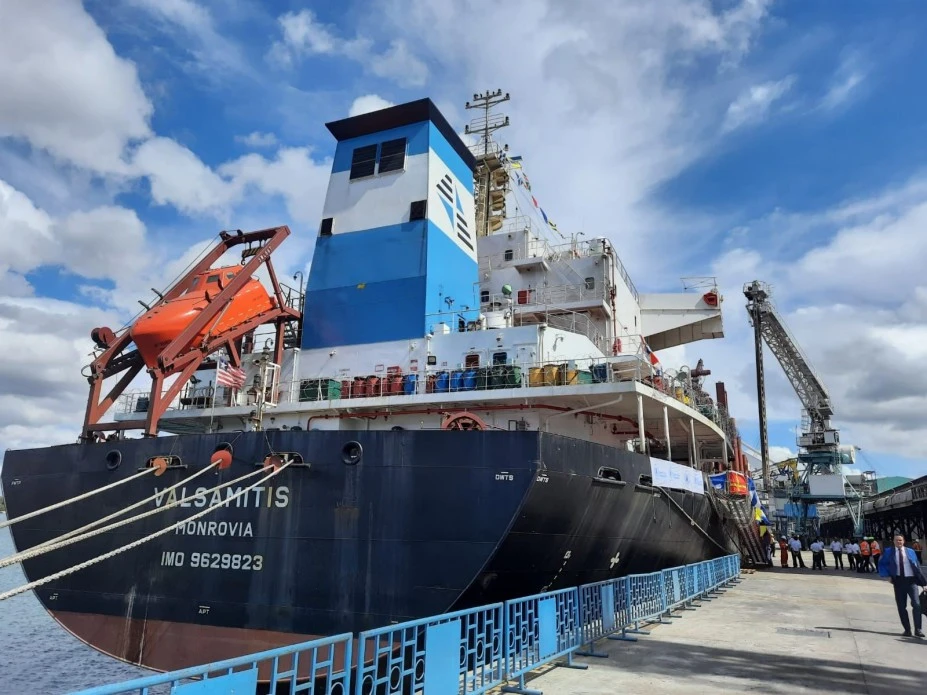
Three foreign ships enter Ukrainian port under NATO jets’ surveillance – Forbes
On Sunday, June 30, despite the completion of the “grain deal,” three civilian cargo ships of foreign origin passed the Russian blockade in the Black Sea and anchored in one of Ukraine’s grain ports in the Danube Delta
This was reported by Forbes USA.
It is noted that three cargo ships belonging to Greek, Israeli, and Turkish-Georgian companies arrived at one of the Ukrainian grain terminals in the port of Izmail in the Danube Delta. They were the first foreign vessels to arrive at Ukrainian ports after Russia withdrew from the grain deal.
According to Forbes, the Greek and Israeli vessels were sailing toward the port of Izmail from the Bosphorus, while the Turkish-Georgian vessel was sailing from northern Turkey. They were walking with their transponders on, not hiding their course.
The ships were observed by four NATO reconnaissance aircraft: a U.S. Navy P-8 patrol aircraft, a military Challenger with surface scanning radar, a U.S. Air Force RQ-4 drone, and a NATO E-3 early warning aircraft.
According to journalists, the planes were not armed, but NATO fighters, including Italian Eurofighters and Romanian F-16s, were on duty in Romania at the time.
“Reports that three civilian vessels have reached Ukraine unimpeded may indicate that Russia is either unwilling or unable to search the ships at this time,” the Institute for the Study of War (ISW) commented.
Forbes emphasizes that the ships that arrived at the Ukrainian port will be loaded with grain, after which they will return along the same route.
What is known about Russia’s withdrawal from the grain deal?
- On July 16, the last vessel loaded with Ukrainian agricultural products under the initiative left the port of Odesa. On July 17, Russia announced the termination of the grain deal. In response, Volodymyr Zelenskyy said that it was necessary to continue using the grain corridor even despite Russia’s withdrawal from the agreement. At the same time, Foreign Minister Dmytro Kuleba began urgent consultations at the UN.
- The White House condemned Russia’s withdrawal from the grain deal, which played a crucial role in lowering global food prices.
- On July 18, Russian Presidential Spokesman Dmitry Peskov announced “certain risks” for the parties that try to resume the Black Sea Grain Initiative without Russian participation.
- European Commission President Ursula von der Leyen said that in order to provide food to the world’s most vulnerable countries and preserve the ability to export Ukrainian goods, it is critical to restore transportation links across the Black Sea.
- On July 19, it became known that Ukraine was considering transporting food as part of a “grain initiative” through the territorial waters of Bulgaria and neighboring Romania.
- At the same time, the Russian Ministry of Defense issued a statement threatening ships heading to Ukraine’s Black Sea ports.
- On July 21, Recep Tayyip Erdogan said he wanted to discuss with his Russian counterpart Vladimir Putin the extension of the grain deal and expressed confidence that it would work again.
- On July 22, Ukrainian President Volodymyr Zelenskyy addressed NATO Secretary General Jens Stoltenberg with a proposal to immediately convene the NATO-Ukraine Council due to the security crisis in the Black Sea.
- Volodymyr Zelenskyy wrote about his conversation with Stoltenberg on Telegram. It is noted that Zelenskyy and Stoltenberg discussed the implementation of the agreements reached during the Vilnius Summit of the Alliance, as well as further steps towards Ukraine’s integration into NATO.
- On July 25, the Main Intelligence Directorate released a report to the Russian leadership, which outlined the technologies used by the Russians to prevent the export of Ukrainian grain, indicating a deliberate disruption of the grain deal.
- On July 26, the UK Ministry of Defense reported that Russia had deployed a modern corvette, the Sergei Kotov, in the southern Black Sea to intercept merchant ships at sea. It patrols the transportation route between the Bosphorus and Odesa.
- Later, it became known that Russia was preparing aircraft and ships to block the Black Sea, detect and destroy ships.
- Russian President Putin said that after unilaterally withdrawing from the Black Sea Grain Initiative, Russia is ready to replace Ukrainian grain and start supplying its own to African countries free of charge.

